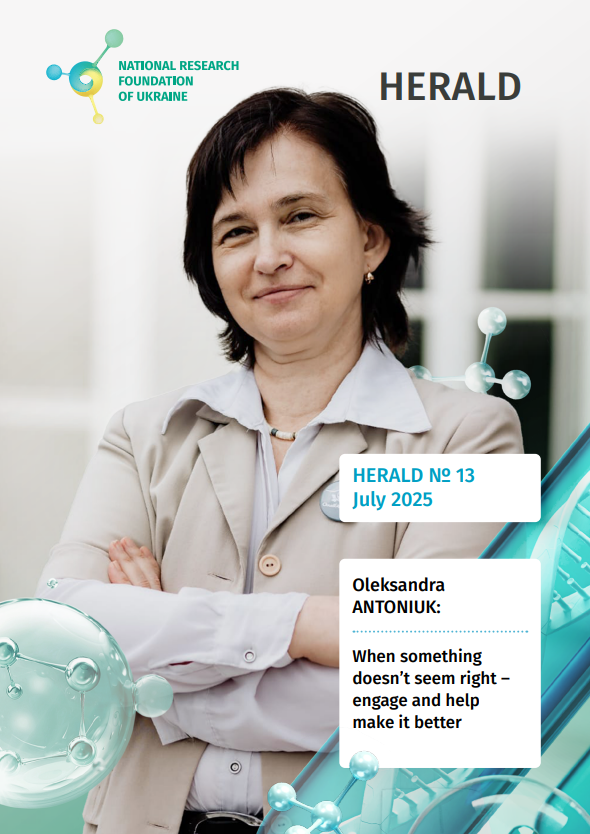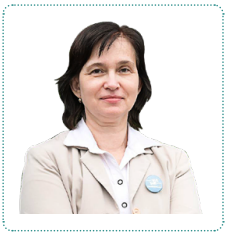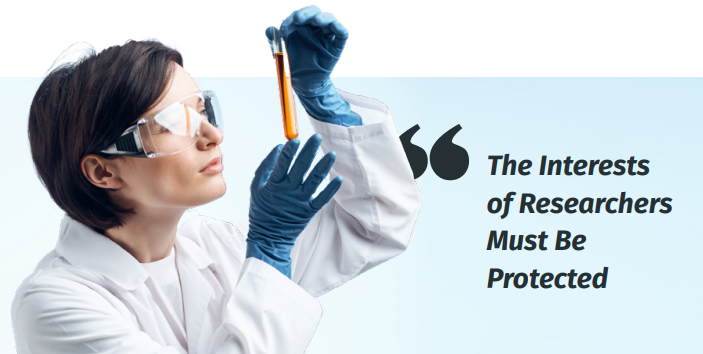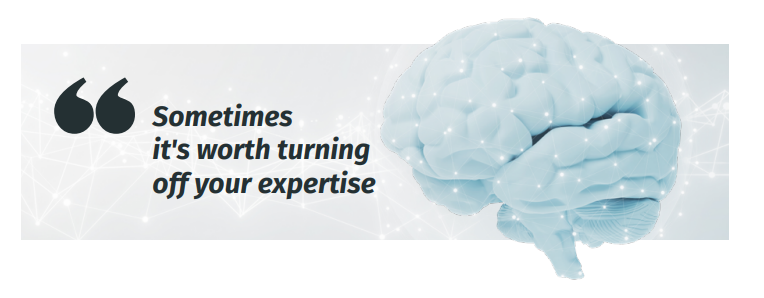
During the war, despite all the hardships, Ukraine’s research sector is undergoing rapid development. New mechanisms for cooperation with international research organizations and foundations are being formed. Among the pioneers paving the way for such collaboration is the National Research Foundation of Ukraine.
Mindsets are also changing: more and more researchers are applying for grant funding both in Ukraine and across Europe and are successful in calls for proposals. Meanwhile, the word ‘entrepreneurship’ is gradually shedding its negative connotation: researchers are mastering entrepreneurial skills and learning how to collaborate effectively with businesses.
We spoke about these and other changes, as well as plans for the development of the research sector, with Oleksandra Antoniuk, Chairperson for the Scientific Committee of the National Council of Ukraine for Science and Technology Development.
– In October 2023, you were elected Chairperson of the Scientific Committee. The Committee is a working collegial body of the National Council of Ukraine for Science and Technology Development, representing the interests of researchers – one of the most competent and courageous groups within Ukraine’s research community. Could you tell us why you agreed to take on this role? What motivated you?
– My colleagues placed their trust in me, and I accepted it. The motivation is simple: if there’s a need to take responsibility and do the work – then it must be done.
A united and professional team has been formed within the Scientific Committee, all members are genuinely committed to our common cause. The Committee also performs the functions of the Supervisory Board of the National Research Foundation of Ukraine. One of the tasks of the Committee is to analyze the activities of the Foundation without interfering in its internal operations. The Foundation’s governing body is the Scientific Council.
I’m glad that these two groups of researchers – the Scientific Committee and the Scientific Council of the Foundation – have found common ground and are collaborating effectively.
We work in the research sphere and shape it, which means we’re also responsible for whether or not society places its trust in researchers. That’s a huge responsibility to ourselves, to society, and to other researchers.
I’m also grateful to the research community for supporting the NRFU, and I understand how important it is to preserve that trust.

– What have you managed to accomplish since becoming Chairperson of the Scientific Committee? What are your goals in this position?
– Among the achievements, I can mention the joint work with the Ministry of Education and Science of Ukraine on the Science City initiative. Together with my colleagues, we invested significant effort into contributing our ideas and developments to the relevant draft legislation. Based on the concept of science parks, it is planned to develop such entities that are to commercialize applied results. A university or research institution will be able to establish an entity that pays reduced taxes, is eligible for zero import duties on equipment, has no salary restrictions, etc. This is extremely important for strengthening collaboration between science and business.
Together with the NRFU, we also contributed to preparing a package of documents regarding capacity building and deregulation of the Foundation’s activities. So that, for instance, in case of inaccuracies in an application or documents regarding the formal requirements for the Foundation’s calls, researchers would have the opportunity to correct them.
If you ask me what the work of the Scientific Committee involves, I would say that every week we review up to 10–12 draft regulatory documents from various ministries related to science. We analyze them in terms of whether they protect interests of researchers and help create proper conditions for the development of science in Ukraine.
I believe we can be proud that the Scientific Committee, together with German partners, held the webinar on Performance-based Research Funding. Representatives from German Federal Ministry of Education and Research (BMBF) and grant organizations shared their experience in developing cooperation models with business, and in the accumulation and use of grants. One of the main takeaways was that profound reforms require increased funding, not just redistribution of existing resources. This is a very important and useful insight for Ukrainian researchers.
Ukraine is integrating into the European Research Area, and necessary regulatory documents are currently being developed and adopted (including on research infrastructure). Members of the Scientific Committee are involved in this process.
In addition to mandatory regulations that Ukraine must adopt, there are also recommended ones, such as the Pact for Research and Innovation in Europe (also known as ‘the Science Pact’). The European Commission recommends that EU countries conclude a kind of social agreement between the research community and the state. Simply put: the state commits to funding research at a proper level, and the research community commits to adhering to the principles of academic integrity, performing research of high-quality, engaging early-career researchers, and so on.
I’m convinced that such a social agreement is exactly what we’re missing. After all, the Law on Scientific and Scientific-Technical Activity provides for research funding at 1.7% of GDP, but this has never been the case. Another important issue is the requirement for university lecturers to perform research which is considered during the accreditation of academic programs. However, this is not properly reflected in official statistics: a third of lecturers’ working time devoted to research is not adequately recorded. In the context of European integration, there is a need to reconsider the approaches for assessing research capacity and output. We plan to strengthen cooperation with the State Statistics Service of Ukraine (SSSU) and involve experts in in the analysis of relevant indicators.
The Scientific Committee is not a legislative body, so constructive cooperation with the Ministry of Education and Science of Ukraine, other ministries, and the Verkhovna Rada Committee on Education, Science, and Innovation is absolutely essential. In many areas, the Scientific Committee has found support for its initiatives. In my opinion, this kind of cooperation is a key element in building a coherent national system, where the knowledge economy plays a central role, and where science is integrated into the processes of economic growth and national security.

– You have repeatedly stated that before demanding high research performance from researchers, proper conditions must be created – above all, decent funding. In your opinion, is it possible to increase funding for research?
– In wartime, it’s not easy to significantly increase state funding, and the Ministry of Finance and the Government must clearly understand what the money is spent on.
There are genuine researchers developing important innovations, and there are those whose research activity raises doubts. For a long time, there has been a substantial lack of public trust in the research community. But that is now changing, there’s a growing demand for collaboration with researchers, particularly in the defense sector.
Unfortunately, current legislation includes absurd restrictions that stifle the initiative of researchers, research institutions, and universities. There are also thousands of different regulations that contradict one another. Leaders of research institutions or universities often face these contradictions and restrictions which inhibit positive initiative.
Launching a research innovation on the market requires investing time, resources, and money. In addition to these risks, there is the risk of failing to comply with an obscure and often outdated regulation.
I hope that gradually this situation will change and it will become both profitable and safe for researchers to show initiative, collaborate with business, and commercialize their developments.

– How can researchers convince policymakers that funding for research needs to be increased? And more broadly, how can they explain to policymakers and government officials that science is an integral part of the economy?
– This is a difficult task, and it is exactly what the Scientific Committee is trying to achieve. I know many government officials who genuinely seek to work effectively. But it’s important for them to see that the funds allocated to various sectors truly bring results. That’s why communication between researchers and society, policymakers, and government officials is so important. I’ve often noticed that researchers (especially startup founders) and government officials or entrepreneurs seem to speak different languages and operate at different speeds. Researchers need to learn to ‘turn off their expertise’ and speak as simply and briefly as possible, and policymakers, in turn, need to learn to listen, hear, and trust researchers.
Beyond that, we need to bridge the gap between the knowledge produced by the research community and the needs of society, the real economy, and business. Of course, this is not only our challenge, but a global one. While in the 16th-17th centuries a scholar could have the most up-to-date knowledge of physics, chemistry, and mathematics at the same time, today humanity’s cumulative knowledge is so immense that it’s impossible to master it within a single lifetime. This calls for a new level of knowledge exchange among researchers and collaboration within interdisciplinary groups. There’s even a whole field dedicated to this challenge – ‘knowledge management’.
Returning to the question of how to communicate with policymakers, business, and the public – we need to learn to explain complex things in simple terms, to set priorities in information and to express our ideas clearly and concisely. These are exactly the kinds of new skills we all need to develop in the context of the ongoing information revolution, where the information space is overflowing with content that isn’t always knowledge. We have to compete for attention, to stand out in the information overload, and to be appealing.

– Innovative research is vital both for national defense and for rebuilding the country during and after the war. In your opinion, what needs to change to ensure the state supports such research in the first place?
– First of all, we need to understand that this is all about people.
Innovation is about freedom of choice, going beyond the known. It is the very freedom of choice that allows researchers to implement their best research and move to the next level of knowledge.
To achieve this, we need the energy of transformation – and that energy comes from human desires and beliefs. Since Soviet times, entrepreneurial initiative was systematically suppressed: small traders were branded as ‘speculators’ or ‘black marketeers’, and even earlier, during the Stalinist repressions, landowners were dispossessed and deported to Siberia. The negative connotation of entrepreneurship is deeply rooted in the public subconscious. And even today, our hard work and entrepreneurship are constantly confronted with this historical trauma.
The Maidan proved that our society holds immense energy for positive change. There is hope that we will overcome the traumas of the past, and that entrepreneurship and innovation – qualities that, as experience shows, are inherent to us – will prevail. This will allow our country to advance to the next stage of development. In particular, legal frameworks and laws will be improved to account for the specific nature of innovation activity.
Take, for example, a critically important system like Prozorro. It is absolutely right that a public procurement system of goods and services should be transparent and fair to minimize corruption risks. On the other hand, if price is the sole criterion for selecting the winner of the tender, innovative products may lose out in such competitions, since price alone does not reflect quality. That’s why the issue of effective funding for innovation are becoming critically important.
In other words, to develop the research and innovation sector, new flexible tools that can both prevent risks and abuse are needed.
As a colleague from the Humboldt community once told me during a meeting: “I’m not a politician, I’m a soil researcher. And if I want something to grow, I need to inhibit the harmful bacteria in the soil and nourish the helpful ones.” The state should follow the same principle: eliminate harmful mechanisms and foster beneficial processes.

– During the wartime, research institutions require maximum support. However, the State Audit Service of Ukraine (SAS) has recently conducted an audit of the NRFU which resulted in questionable claims, for instance, regarding ‘high salaries’ of researchers under the Foundation’s projects. How do you assess the role of such audits under the current circumstances, and what could be the consequences for research in Ukraine?
– It seems to me that the main issue lies in the need to more clearly define the scope of expertise when we talk about expert assessment of financial activities of a state institution or university within the framework of an audit. For example, the feasibility of research on viral infections after the end of the COVID-19 pandemic should be assessed exclusively on the basis of peer review. That’s why the research community uses the peer-to-peer review system. So far, no one has come up with a better method than independent review conducted by an expert in the relevant field.
If we want to foster development and encourage bold initiatives from researchers and innovators, the SAS audit procedures need to be reconsidered. Currently, they still retain many features inherited from Soviet times when the goal was to intimidate business and control financial flows. I believe it’s time to look at these issues strategically, through the lens of creating conditions for initiatives that move the country forward. I would welcome the opportunity to establish a joint working group involving both SAS auditors and reviewers who develop assessment methodologies in order to improve these instruments, considering the specifics of research spheres and the market economy.
We should also consider creating an effective appeal mechanism to ensure impartial and professional review of auditors’ conclusions regarding research and innovation activities at universities or state institutions.
I hope this issue will be resolved. For the state to be strong, the Foundation and other research organizations must function stably.

– The Scientific Committee serves as the Supervisory Board of the NRFU. In your opinion, what challenges has the Foundation faced during the war years? Has it managed to overcome these challenges?
– The biggest challenge, of course, was the budget sequestration in 2022, when the Foundation’s funds were redirected to cover the defense needs. I would like to acknowledge the efforts of the NRFU Executive Director Olga Polotska, who from the very first day of the full-scale invasion actively sought additional funding to support Ukrainian researchers. Thanks to her efforts, as well as the assistance of the Head of the Foundation Stanislav Vilchynskii and the help of researchers from various countries, additional funding was attracted for Ukrainian researchers.
Later, the situation improved, and state budget allocations for grant support were restored.
I’m impressed that the Foundation continuously learns from experience and works on the bugs, for instance, by improving communication, updating the peer review process, and proposing changes to its regulatory framework in order to reduce bureaucracy during the application and project implementation phases.
At the beginning, the review process raised some concerns, but since the first calls for proposals were held, many improvements have been made.
Of course, there is still much to be improved. These challenges are part of the growth process. The Foundation is a young institution, evolving under very difficult conditions and we are learning along with it.
I am convinced that everyone who wants the Foundation to function better should join the team and help make it more advanced. The only effective way to improve something is: When something doesn’t seem right – engage and help make it better.

– In your opinion, what should be changed in the Foundation’s work in the near future?
– The online application system should be improved to make it more convenient and modern. It’s quite expensive, so far, the Foundation doesn’t have the funds to upgrade the platform.
It would also be helpful if new calls did not include unexpected conditions. Writing a high-quality project from scratch in just two months is not easy. Therefore, in my opinion, it would be clearer for researchers to work within the framework of established terms and conditions, of course, considering the priority areas for the state. After all, the more complicated the terms and conditions, the more errors in applications.
By the way, one of the key achievements is the launch of the Horizon Europe Office in Ukraine on the basis of the NRFU. This became possible thanks to the personal initiative and efforts of the NRFU Executive Director Olga Polotska.
Currently, the Office is led by a strong team under the leadership of Igor Taranov and there are already good results. This is an important project that helps Ukrainian researchers receive external funding under the Horizon Europe programme. These funds not only contribute to research development in Ukraine but also to the national economy.
– What positive changes in research do you notice, despite the war?
– The fact that researchers continue working on important projects under extremely difficult conditions is a huge achievement. Despite destroyed laboratories, broken windows, and losses. Every human life, every human personality is valuable, and researchers are irreplaceable, because each one is a universe that develops new ideas and knowledge.
At the same time, war gives impetus to innovative development. We see many requests coming from the battlefield, and researchers are developing new solutions.
Researchers who were forced to flee abroad have become our new research diaspora and serve as key connectors with foreign universities and research centers. Many are now returning, bringing with them new international contacts and collaborations.
Ukrainian science has become more visible globally and is attracting growing interest. I sincerely hope that after this war we will become more united, and that Ukrainian science will become stronger.
Interviewed by Svitlana GALATA

